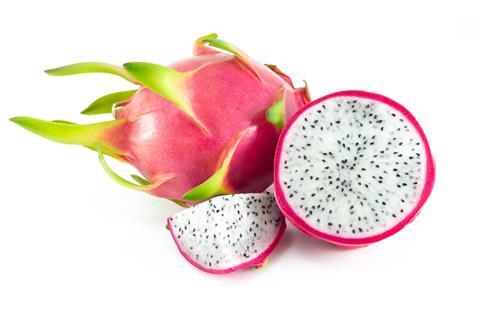Five-year project looks at how to optimise cultivation in northwest of the country

Scientists are studying the potential to develop production of dragon fruit, or pitahaya, in the northwest of Argentina. The country’s National Agricultural Technology Institute (Inta) is trialling production of white, red and yellow pitahaya at its experimental station in Yuto.
Known for its attractive appearance and high level of antioxidants, pitahaya is attracting growing interest from producers and consumers worldwide.
Carina Armella, a researcher at Inta, said: “Producers in the northwest of Argentina are seeing the pitahaya as an alternative for diversification. It is very well accepted not only for its productive potential, but also for its adaptation to the area’s subtropical climate. Although it is a tropical fruit, it develops very well thanks to its rusticity”.
Since 2019, Inta has been evaluating the agronomic behaviour of different pitahaya clones that were introduced through a survey of different areas of the Argentine Northwest. And the institute’s work is not limited to pitahaya – mango, avocado, papaya and passion fruit are also being trialled in the region.
“We have [pitahaya varieties] with red or fuchsia pulp, white and red, pink or yellow skin, which increases the diversity of options for consumers,” Armella said.
One of the limitations of cultivation is pollination. “The pitahaya flowers at night and, due to incompatibility problems, requires manual pollination to produce fruit. Previously, we had only two clones that were incompatible, so we were unable to harvest spontaneously pollinated fruit. Now, with the incorporation of various varieties, we are evaluating which clones produce good quality fruit and which do so with spontaneous pollination and which require manual pollination,” Armella continued.
She said local producers are showing great interest in the fruit, with a number having already begun to grow these plants and are learning about their management.
The initiative is being supported by the f the FOAR Project (Argentine Fund for International Cooperation) for Argentine-Vietnamese cooperation in tropical fruit growing. This is a project led by Inta and the South Vietnam Horticulture Institute (Sofri), which seeks to improve the competitiveness and sustainability of the sector through research and technology transfer.
“It focuses on the development and implementation of sustainable agronomic practices, the use of biotechnology and optimisation of harvest and post-harvest management techniques for tropical fruits,” Armella explained. “Soon, we will carry out the fourth mission to Vietnam, where two professionals from Inta Yuto (Jujuy) and Cerro Azul (Misiones) will travel to train in the technological development of these crops.”
Inta said it expects consumer demand for pitahaya to grow as knowledge and acceptance of this exotic fruit increases.



